#META TIME; BOYS
Text
do you ever think about the sheer grief that pervades so much of fëanor's story in general...? his grief and his resentment towards míriel seem to make up such an integral part of his being and what drives him as a whole. for him, even the mere suggestion that something might be perceived as an insult against his mother is just too much to handle. in a sense, he's still so obsessed with protecting her honor, even when she has long since passed into the halls of mandos and vairë.
there's just this profound sense of loss that makes so much more sense when you think about fëanor as an individual who is still grieving the loss of his mother and grappling with the consequences of his father's actions.
in the The Shibboleth of Fëanor from The Peoples of Middle-Earth, there's this lovely little passage that tells fëanor's story a bit differently, amongst a description of his Linguistics Snobbery: it describes míriel's death (which, notably, does not occur soon after his birth, but a bit later on) as a 'lasting grief to fëanor', which influenced many of the disastrous actions he took later on. when she dies, fëanor takes guard of her sleeping body and hröa, for a time.
to me, it's such an accurate depiction of grief: it's not something that fëanor struggles with for a time and then forgets, and it's not beautiful and tragic: it's ugly, it's life-long, and it cuts fëanor so deeply that he never fully recovers from it. it's a shame that this particular narrative of grief doesn't get as much attention as it should; people tend to dismiss fëanor as unhinged and nothing more, but, like... grief makes you do crazy things and it changes you so much. it doesn't justify what fëanor does throughout the silmarillion, of course, but it explains a great deal.
#META TIME; BOYS#behold: my creation!#behold! my creation#the silmarillion#feanor#fëanor#lotr#tolkien#the house of fëanor#silm#silmarillion#tolkien meta
919 notes
·
View notes
Text
Mithrun's desire as an SA analogue
TW discussion of SA and detailed breakdown of aesthetics evoking SA. The way I discuss this is vivid in a way that may be triggering, though there is no discussion of actual sexual assault. Just survivor's responses to it.
People relate to Mithrun and see his condition as an analogue for a few different things, like brain injury or depression. And I think all of them are there. But I also see Mithrun's story as an SA analogue, and Ryoko Kui intentionally evokes those aesthetics. I think it's a part of Mithrun's character that a lot of people miss, but I very much consider it text. This is partially inspired by @heird99's post on what makes this scene so disturbing; so check out their post, too :)
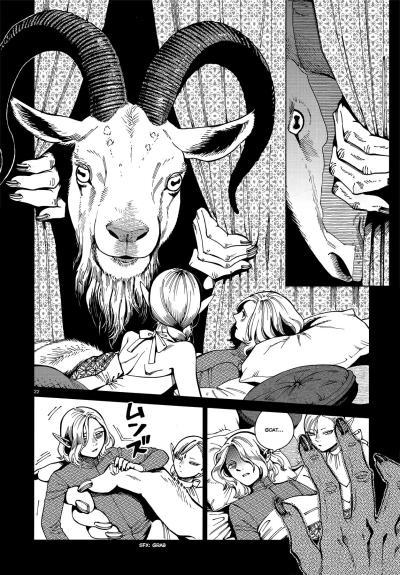
So to start off with, the demon invades Mithrun's bed, specifically. There's even a canopy around it, which specifically evokes this idea of personal intrusion; the barrier is being pulled apart without consent or warning. The way the hand reaches towards Mithrun's body from outside of the panel division makes it almost look like the goat stroking over his body. It's an especially creepy visual detail; similarly, the goat's right hand parts into the side of the panel as well. It's literally like it's tearing the page apart; but gently. So gently.
Mithrun is in bed. It is his bed that the demon is intruding on. He's in a position of intimacy. The woman behind him is a facsimile of his "beloved" that he left behind; the woman who, in reality, chose Mithrun's brother. He is in bed with his fantasy lover, who is leaning over him. While this scene isn't explicitly sexual, it is intimate. And it is being invaded. The goat lifts Mithrun gently, who is confused, but not yet struggling.
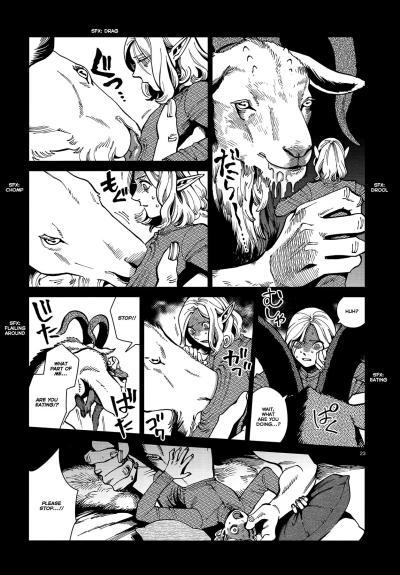
The erotics of consumption and violence in Ryoko Kui's work(remember that the word 'erotic' can have many different meanings, please) are a... notable part of some of her illustrations. I would say she blurs the lines between all forms of desire: personal, sexual, gustatory and carnal, in her illustrations in order to emphasize the pure desire she wants to work with and evoke to serve her themes. Kui deploys sexual imagery in a lot of places in Dungeon Meshi, and this is one of them.
In this case, horrifically. The goat's assault begins with drooling, licking, and nuzzling. The goat could be enjoying and "playing with" its food. But it can also be interpreted as it "preparing" Mithrun with its tongue as it begins to literally breach Mithrun's body. The goat also invades directly through his clothing; that adds another level of disturbing to me. There's nothing Mithrun can do in this moment of violation. Mithrun is fighting, but he is fighting weakly, trying to grip on and push away when he has no ability or option to. All he can do is beg the goat to stop. And it doesn't care. This all evokes sexual assault.
The sixth panel demonstrates a somewhat sexual position, with Mithrun's thighs spread around the goat's hunched over body. In the next, the goat pulls and holds apart Mithrun's thighs as he nuzzles into him. The way the clothing bunches up looks a bit as if it has been pushed up. It has pinned Mithrun down onto the bed, into Mithrun's soft furs and pillows. It takes a place made to be supernaturally warm and comfortable, and violates it. It's utterly and intimately horrifying. To me, this sequence of positions directly evokes a rape scene. I think Kui did this very explicitly. These references to sexual invasion are part of what makes this scene so disturbing; albeit, to many viewers, subconsciously.
This is also the moment the goat takes Mithrun's eye. Other than this, the goat seems exceptionally strong, but also... gentle. It holds Mithrun's body tightly, but moves it around slowly. It doesn't need to hurt Mithrun physically. But in that moment, it takes Mithrun's eye. Blood seeps from a wound while an orifice that should not be pierced is penetrated. This moment, the ooze of blood in one place specifically, also evokes rape. That single bit of physical gore is a very powerful bit of imagery to me.
Finally; it is Mithrun's desire that is eaten. After his assault, Mithrun can find no pleasure in things that he once did. He is fully disassociated from his emotions. This is a common response to trauma, especially in the case of SA. It's not uncommon for people to never, or take a long time to, enjoy sex in the same way again; or at all. They might feel like their rapist has robbed them of a desire and pleasure they once had. I think this makes Mithrun's lack of desire a partial analogue for the trauma of sexual assault.
Mithrun's desire for revenge was, supposedly, all that remained. Anger at his assaulter, anger at every being that was like it; though, perhaps not anger. Devotion, in a way. To his cause. I don't know. But the immediate desire to seek revenge is another response to SA. But on to Mithrun's true feelings on the matter.

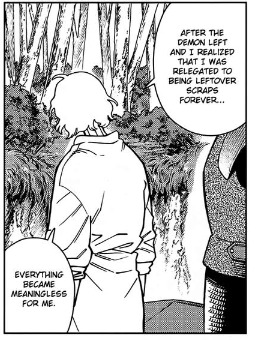
This is... So incredibly tragic. Mithrun feels used up. Like his best parts have been taken away. Like he's being... tossed aside. This certainly parallels the way assault victims can feel after being left by an abuser. Or the way assault victims feel they might be "ruined" forever for other partners. These are common sentiments for survivors to carry, and need to overcome. In the text, it's almost like Mithrun feels the only being who can desire him is a demon who might "finish devouring" him. That that's his only use. It's worth noting that Mithrun trusted the demon. Mithrun's world was built by the demon, and Mithrun, in that way, was cared for by the demon. I think this reinforces Mithrun's place as a victim.
There's also something to be said about Mithrun as a victim of his own possessive romantic and sexual desire. The mirror shows him his beloved just dining with his brother, and it infuriates him. He doesn't know if the vision is real, nor if she has really chosen his brother as a romantic partner. The goat then creates a whole fantasy world where she loves him. As Mithrun's dungeon deteriorates, she is the only person that continues to exist. Mithrun continues to have control over her. And that is the strongest desire the demon is eating, isn't it? There's something interesting there, but I don't know what to say about it.
In conclusion, I think Mithrun's story is an explicit analogue for sexual assault-- though, certainly, among other things! The way the scene plays out and is composed explicitly references sexual violation and invasion of the body. His condition mirrors common trauma responses to sexual violence. And, at the end, he finally realizes he can recover.

Let's end on a happy Mithrun, after taking the first step on his journey to recovery :) You aren't vegetable scraps Mithrun. But even if you were-- every single thing in this world has value. Even vegetable scraps.
#Mithrun#mithrun dungeon meshi#dungeon meshi#ren rambles#dungeon meshi meta#tag later#I refuse to post at prime time look at my dunmeshi meta boy#tw sa#sa tw#this is literally 1200 words slash 6 pages if I added citations and a proper essay format as well as an introduction to Mithrun's character#and general introduction of the text itself#this could literally be an academic paper#lmao#ren meta#rb this plsss i want ppl to read my essay
1K notes
·
View notes
Text
Bruce, picking up a stray: "He reminds me of me!" :333
Bruce, a couple of years later: "Why is he such a stubborn, self-destructive drama queen??" >((
#the girls are exempt#babs is a colleague steph is the kimmy gibbler and he forgets cass is a human girl and not a justice machine half the time#it's all about the blue eyed black haired boy children#same mini-Bruce different presentations#bruce wayne#batfamily#batfam#dick grayson#jason todd#tim drake#damian wayne#dcu#crack meta#spite waffle
10K notes
·
View notes
Text
Honestly, the ghosts can feel other ghosts theory is very well supported, and I would like to share some proof shown during the season.
In episode 1, Charles clearly felt the other ghost (the WWI soldier, Wilfred) strangling him, he also got his face covered in that black liquid after he took the cursed mask off his face.
If ghosts could be able to play the same rules with other ghosts as they do with the living, Charles could have chosen to simply pass through Wilfred and seize the knife. However, he was unable to do so.
Also, during Episode 3, when that ghost's head exploded, Charles and Edwin were covered with the pieces of his ghostly brain, so I guess, fluids are other things that have their own rules when we talk about ghost-to-ghost interaction.
Sure these are not the prettiest of examples, but they support my point just fine. And I guess, it's good information for when you're writing... All sorts of fanfiction.
#if you want another proof—but one that is incredibly more disgusting#The Devlin family were all ghosts. every object attached to the loop was part of their ghostly environment#Still the mother and the girls felt everything every time Mr. Devlin massacred them.#dead boy detectives#dead boy detective netflix#dead boy detective agency#dead boy detectives agency#edwin payne#edwin paine#charles rowland#paineland#payneland#painland#paynland#chedwin#dbda fanfic#dbda meta#notebook entry#[s1e3] the case of the devlin house#[s1e1] the case of crystal palace
523 notes
·
View notes
Text

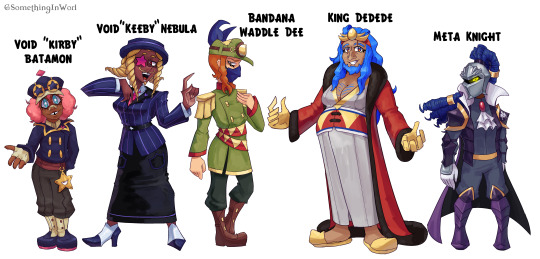
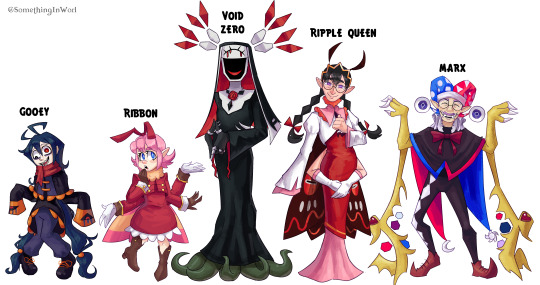
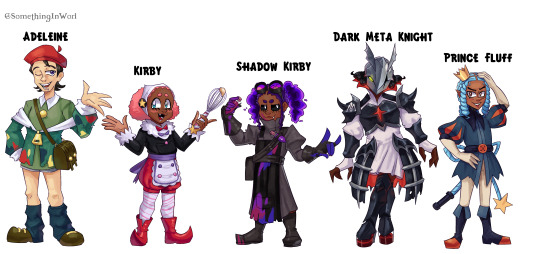
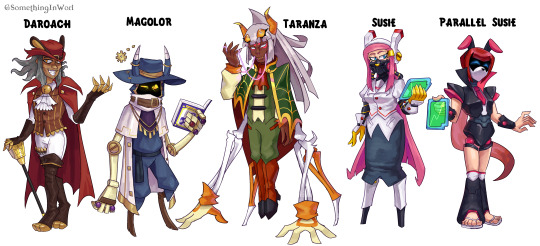
Hi!! I've been working on this for months!! Now I'm proud to present to you; My Kirby gijinkas!
Let me know whatcha think!
#CapnArt#I don't usually ask this but#I'd appreciate if you could support the post#It took so long ffds#ok now tagging time oh boy#Kirby#Dark Nebula#Bandana Waddle Dee#King Dedede#Meta Knight#Gooey#Ribbon Kirby#Zero Kirby#Queen Ripple#Marx Kirby#Adeleine#Shadow Kirby#Dark Meta Knight#Prince Fluff#Daroach#Magolor#Taranza#Susie Haltmann#Parallel Susie#Kirby gijinka#Gijinka#Lineup
575 notes
·
View notes
Text
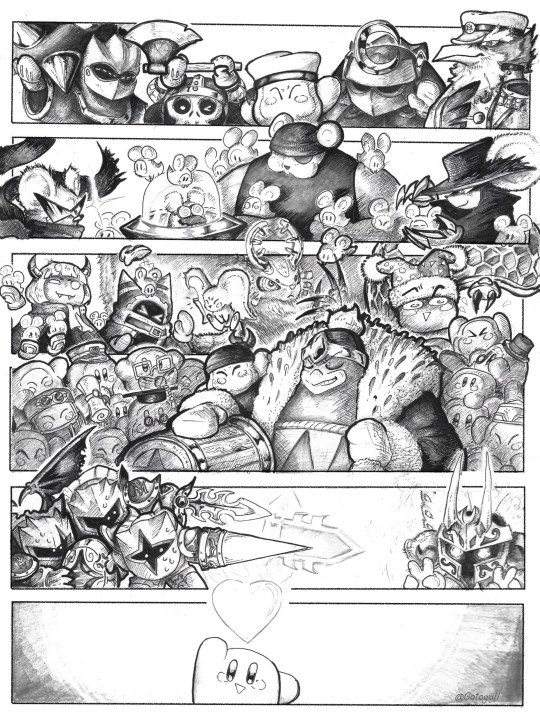
Kirby and their villains friends
#oh boy#time to tag#kirby#meta knight#dark meta knight#galacta knight#morpho knight#king dedede#bandana dee#bandana waddle dee#marx kirby#elfilin#fecto elfilis#magolor#taranza#daroach#squeak squad#captain vul#trident knight#sailor dee#sailor waddle dee#axe knight#mace knight#gull#omg#done
3K notes
·
View notes
Text
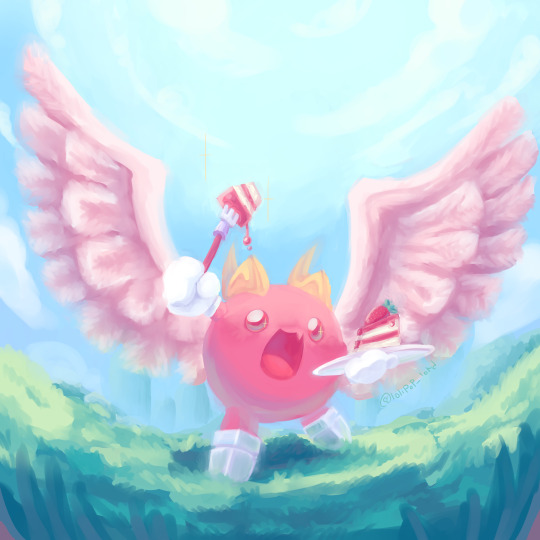
they found the greatest sweets in the galaxy!!
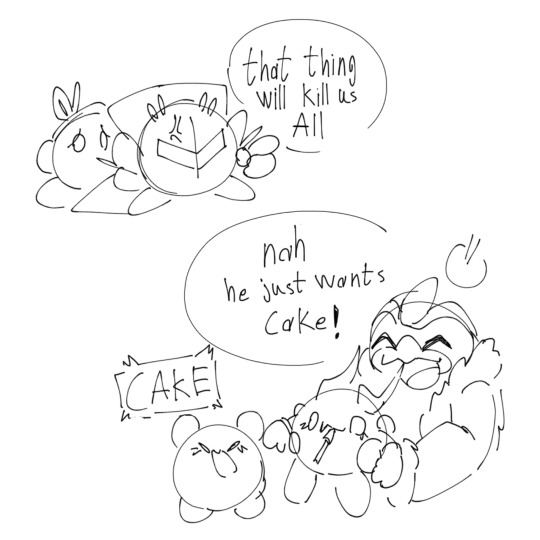
this is basically the plot of my comic lol
#kirby#kirby fanart#kirby fandom#galacta knight#meta knight#king dedede#galacta is my boi and i will die for himp!!!#i wish i could paint more but man it takes so long and i barely have time to draw
413 notes
·
View notes
Text
thinking again about how the first thing arthur said to his mother is an apology. he risked his life, literally put his head on a chopping board just for an opportunity to see her and apologize. I'm-
and his little "I cannot bear the thought that you died because of me" SJFGKJDSF he's been carrying that burden on his shoulder for so long I'm gonna go chew glass
do yáll think the reason he's always so eager to sacrifice his life for other people is cause he doesn't think he deserved to be alive in the first place??
#arthur pendragon#bbc merlin#meta#???ig#merlin#mama's boy arthur#you'll always be beloved to me <3#also imagine all the times uther calls him a “disappointing son”#he's imagining his mother being disappointed in his as well
349 notes
·
View notes
Text
More about Blitz and anger . . .
Anger is a super stigmatized emotion. That's for a reason- it's powerful. When we see it from other people it's usually externalized- it's ugly, aggressive, shows up in abusive situations- it sometimes leads to violence. But when we talk about righteous anger, or the anger of marginalized people, we sometimes praise it. That's because anger can be empowering too.
I want to talk about how Blitz's anger, while it's also destructive at times, has empowered him.
Personal note: when I was a kid, I was yelled at frequently by my mother. The house I grew up in was a 60's rancher with a long hallway in the center, and she would chase me down the hallway yelling. As I grew older, I learned to yell back. Feeling anger and externalizing it didn't make the hurt go away, and it didn't solve our problems- it turned us into two people yelling at each other- but it did make me feel less helpless.
So let's look at Blitz as a kid. In addition to guilt tripping him, his father tells him that "there are scarier things," than stealing from a wealthy and (literally) powerful family, and he doesn't disagree. I think this screenshot captures their relationship pretty well.
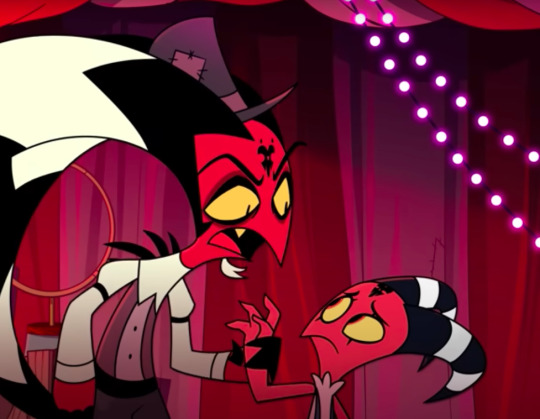
We see moments of defiance from Blitz though, even as he's very much under Cash's control. Georgia Dow pointed this out in her video about how Blitz learned resilience in his childhood. Here, have some defiant expressions:
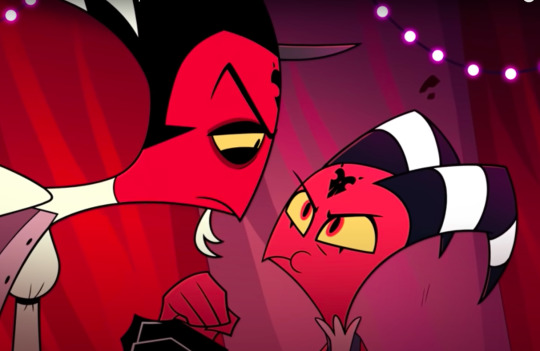
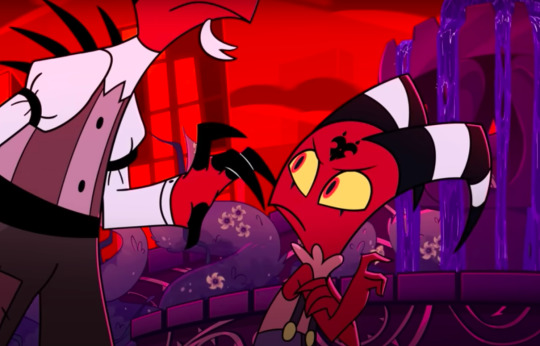
Notice Blitz's eyebrows here, mirroring his father. I suspect that as he grew older, Blitz learned to push back harder, to argue, maybe even to yell. He learned to channel his anger- at being used, diminished, devalued (very likely yelled at and probably physically hurt too) into expression, into fight (I don't picture him physically fighting Cash, but the guy has fight in him- of all kinds).
He learned to feel angry at the world and express that too- for treating imps as lower than other demons, for limiting his options in life, for filling the road to success with exploitation (as we see in the Mammon flashbacks with Fizz).
Speaking of that flashback, he's very ready, as a teenager, to express anger exactly when he needs to for the purpose of protecting a loved one.
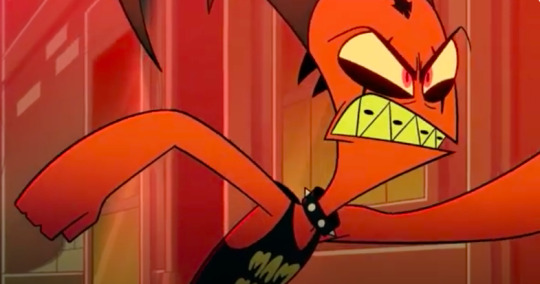
Fast forward to the present.
Blitz's anger helps him stand up for the people he cares about- see Fizz in the present at Mammon's show but also Moxxie in Spring Broken.

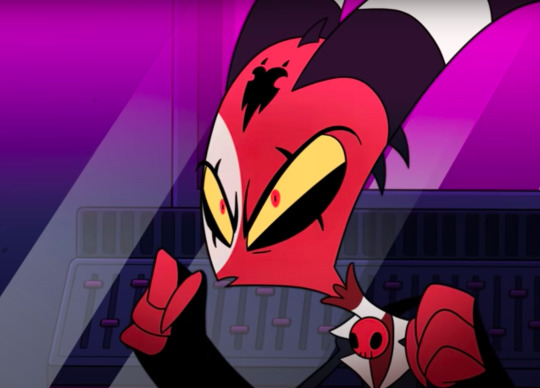
It helps make him good at his job too. When we see him fight, he doesn't tend to seem all out enraged, but he's super determined and all in. He's at home in a conflict. When he's doing his best fighting, we see a mix of the "angry" facial expressions and pure confidence.
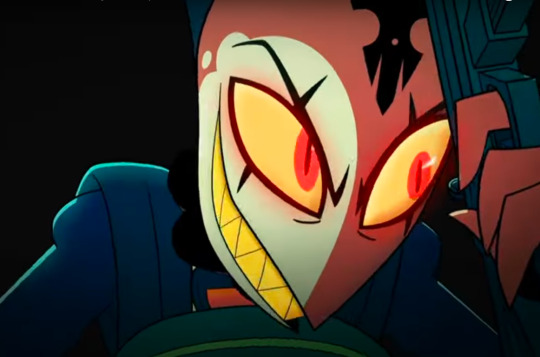
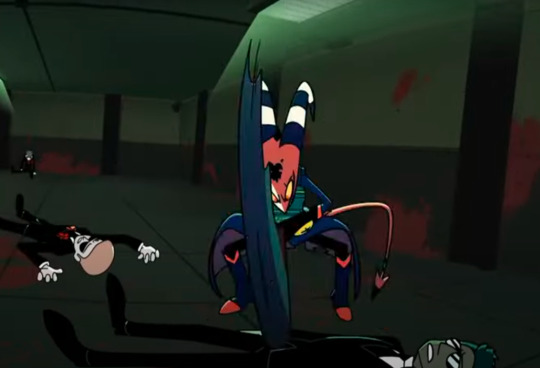
Anger also helps him manage a lot of difficult emotions. Disclaimer (and idea I'll get back to soon)- I said manage, not deal with.
When he interacts with Verosika and with Robo Fizz early in season 1, there's genuine underlying pain from how the relationships with Verosika and the real Fizz ended, but he channels that into anger. The anger makes him take action (Good action? Eh. But still action- he's not crying on his couch.) rather than get consumed by more painful emotions. He's able to keep going.
It also gets in his way, even as he uses it as a coping mechanism. Is his anger at Muffy and the Karen in the doctor's office understandable as he's dealing with his frustration about the inaccessibility of healthcare for Loona and his worries about losing Stolas? Yes. Is it helpful? No, probably not.

It isn't useful with Stolas either. Stolas is this person who's kind and beautiful and quirky and able to match his wit, and who Blitz has grown genuine feelings for, but who is also deeply entwined in the unfairness in Hell's society that Blitz has grown to resent throughout his life- AND Stolas unknowingly participates in some very familiar microaggressions himself.
Blitz channels a whole range of complicated emotions- love, fear, despair at the thought that he isn't loved back- all into anger because he HAS been wronged and his world IS unfair, and anger is COMFORTABLE because anger is ACTIVE, and with it he doesn't have to just let things happen to him!
So we end up back here.
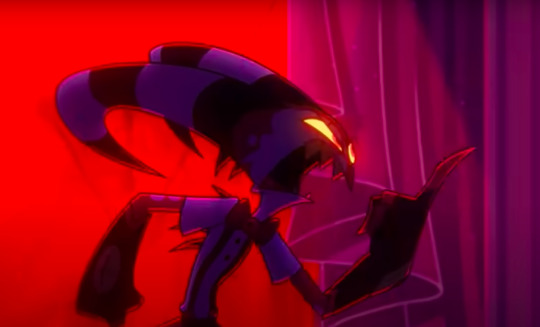
#Okay pretty proud of this one#anger essays part 2?#blitzo buckzo#helluva boss#stolitz#blitz#blitzo#my helluva meta#I'm not going to put a value judgment on his anger at the end in this one- it's understandable#but yes also he IS unknowingly yelling at an abuse victim#It's complicated#let our boy be complicated and be right and also wrong at the same time
210 notes
·
View notes
Text
One thing that I feel is really interesting and often forgotten about Essek is that fundamentally, his characterization has been from the start based upon his desperation for external perspectives and connection, which, along with much of his narrative and mechanical positioning, means that he actually has an extraordinary and almost (but not actually, as I'll show) counterintuitive capacity for both growth and trust.
(Buckle in. This is a long one.)
In particular, I would argue, knowing now that many places where the plot touches Ludinus have long been marked for connecting back into the current plot, that he was quite possibly built as a prime candidate for radicalization by the Ruby Vanguard. He felt isolated from his culture, he was desperate for other connection, and he was certainly of the type to believe he was too smart to be drawn into such a thing, given his initial belief that he could control the situation and the fallout. If things had gone any other way, he easily could've been on the other side by now.
As such, he has been hallmarked by being fairly open to suggestion, perhaps for this reason, but the thing about that kind of trait is that it is both how people are radicalized and deradicalized. This is certainly true of Essek, who experienced genuine kindness and quite frankly strangeness from the Nein and was able to move from the isolation the Assembly had engendered to meaningful and genuine connection, largely propelled by his own internal reflection. By the time Nein are aware of his crimes, he's already begun to express regret to an extent and, furthermore, doubt in the Assembly, including explicitly drawing a line against Ludinus, even in a position where he was on his own and probably quite vulnerable.
Similarly, when the Nein reach the Vurmas Outpost some weeks later, he has moved from regret for the position he's ended up carrying a heavy remorse. This makes sense! He's fairly introspective, seems used to spending a lot of time in his own head, and was left with plenty to mull over. It's not some kind of retcon for him to have progressed well past where the Nein left him; it just means he's an active participant in the world who has done his own work in the meantime.
This is another interesting aspect to him. I've talked about this a bit before but I cannot find the post so I'll recap here: antagonists in D&D have significantly more agency than allied NPCs. Antagonists are active forces, against which the party is meant to struggle; allies are meant to support the PCs, which means they tend to be more passive in both their actions and their character growth. Essek was both built as an antagonist, in a position that gives him significant agency, and also was then given significant opportunity to grow specifically to act as a narrative mirror for Caleb's arc. Even when he becomes a more traditional D&D ally, he still retains much of that, though he occupies a supporting role.
I believe that this is especially true because of the nature of Caleb's arc, which I've already written on; the tl;dr of this post is that Caleb is both convinced that he is permanently ruined and also desperate to prove that change is possible. Essek is that proof, because he is simply the character in a position to do so. But this also means that his propensity for introspection and openness is accentuated! He has to do the legwork on his own, for the most part, because that's where he is in the meantime.
But he still ends the campaign necessarily constricted; he is under significant scrutiny, he's at risk from the Assembly, and he goes on the run fairly soon after the story ends. He spends most of the final arc anxious and paranoid, which is valid given the crushing reality of his situation. It would be very easy to extrapolate that seven years into this reality, he would be insular, closed off, and suspicious of strangers, even in spite of the lessons he's learned from the Nein and their long term exposure.
So seeing his openness and lightness now is surprising, but at the same time, given this combination of factors in his position in the narrative over time and his defining traits, it's not by any means unreasonable.
But one thing that I found so delightful is how much trust he exhibits, which is obviously a wild thing to say about Essek in particular, given much of what he learns is both earning and offering trust, which was something he says explicitly in 2x124 that he's never really experienced: "I've never really been trusted and so I did not trust." It makes up much of the progression of his relationship with Caleb, and the trust that he is offered by the Nein in walking off the ship is the impetus he needs to grow.
But I think it's easy to talk about trust when it comes to people who have proven themselves to you or to whom you've ingratiated yourself, and that's really the most we can say about Essek by the time he leaves the Blooming Grove. There is this sense in a lot of discussion of trust (not solely in this fandom) that it is only related to either naivete or love, but there's far more to it. Trust at its best is deliberate—cultivating an openness to the world at large is a great way to combat cynicism and beget connection instead. It allows a person to maintain curiosity and be open to experience, but it can be incredibly difficult to hold onto.
It is clear that the Essek we meet now is a very pointedly and intentionally trusting individual. He trusts Caleb and by extension Caleb's trust in Keyleth, as he shows up and picks up a group of strangers from a foreign military encampment and walks in without issue. He trusts the Hells to follow his lead moving through Zadash and to exhibit enough discretion so as to avoid bringing suspicion upon all of them. He trusts that Astrid will respond well to his entrance, but he also trusts himself and the Hells enough to execute a back-up plan in the case that she doesn't. In the end, he even trusts them enough to give them his name and identity.
He doesn't scan as someone who has spent half a dozen years living like a prey animal, afraid of any shadow he runs across in an alley, withdrawn into himself and an insular family, which would've been an easy route for him to take. He scans as someone who has learned the kind of trust borne of learned confidence and a trained eye for good will and kindness, which are crucial weapons one would need for staving off cynicism in his circumstances—as if he has survived thanks more to connection and kindness than paranoia and isolation. (If we want to be saccharine about it, he scans quite poignantly as a member of the Mighty Nein.)
So it is easy to imagine this trust and openness as a natural progression of his initial search for perspectives external to his own cultural knowledge. Though he makes those first connections with the Assembly to try to vindicate his personal hypotheses, he finds in them exposure to the deepest corruption among Exandrian mortals, which could've—and did, for a time—turned him further down that same dark path.
But it's also this same openness to exposure from the wider world that allows the Nein to influence him for the better, and in spite of the challenges he's certainly faced simply surviving over the past seven years, he seems to have held onto this openness enough to move through the world with self-assurance and a willingness to extend the kinds of trust and good will that he has been shown.
(I would be remiss not to mention that I was reminded about my thoughts on this by this lovely post from sky-scribbles and their use in the tags of 'light' to describe Essek's demeanor this episode, which is really such an apt word for it.)
#something something hope is a weapon hope is a discipline hope is a garden to cultivate!!!#HE'S SO GOOD HE IS TRULY EXEMPLAR OF THE WHOLE PHILOSOPHY OF THE NEIN AND I DO NOT THINK THAT'S AN ACCIDENT#truly just like. enormous proponent of letting trust and curiosity into your heart regardless of the horrors.#it's hard and it makes you more vulnerable and sometimes it hurts so so much but it will also save your fucking life!#cr spoilers#critical role#essek thelyss#cr meta#I was gonna apologize for the length but I'm not sorry. I'm also not sorry for being insane about him but he's so special to me.#head in my hands he's so GOOD HE'S BEST BOI! GUIDING LIGHT NORTH STAR!!! LOOK AT HIM!!!#also truly if i had two nickels for a span of time with no essek sightings where I wrote a lot of fic#with deliberate personal acknowledgment that I was writing some pretty maximal arcs for him in terms of character growth#and then end up getting essek for half an episode and having to go OH WE'RE GOING THAT FAR ACTUALLY. FUCKING INCREDIBLE.#yanno. two nickels. but good lord I am thriving that it's happened twice#augh this is ONE of the pieces I need to write this week. we're not gonna talk about it
343 notes
·
View notes
Text
This doesn't even feel like fanservice though. Like, I'm not a stranger to shows at are explcitly queer. I've watched my share of BL. I know what fanservice feels like and looks like.
This is ...something else. This is like...GENUINE on a level that goes beyond fanservice. Fanservice, by definition is cynical. It's done to appease a market, to keep an audience engaged, so they will keep watching to make everyone involved money.
I feel like what we're getting from S2 of OFMD is...not motivated in that way. Like of course they want to succeed and get to keep making TV and probably want to make themselves money.
But, I feel like this is about actually playing out character stories in genuine ways. It's not unearned, it's not extraneous, but it IS kind. I think after the end of S1 and the beginning of S2 we forgot how kind ofmd can be as a show to its characters.
But letting Ed get to feel like he CAN earn his way back into a happy family is kind. Letting Stede and Ed be together, talking things out is kind, letting them set their own boundaries and terms is kind. It's not doing everything for max drama, which is how dramatic TV and romance tends to go these days.
So it feels like a gift to fans in a way that is rare, but it's not a cynical one. I think fanservice is a very incorrect word for what this show is doing. It's doing what it WANTS to do, knowing it has a fanbase that will support it whether that's torturing its characters or painting romantic scenes under moonlight. And it gets to be both, and I love it so very much.
#is this coherent?#I have no idea I just finished ep 5 and I'm screaming.#also I've just realized that was ep 5 and it was ep 5 the first time we got the moonlight scene#oh boy that's a little ominous#ofmd#ofmd s2#ofmd s2 spoilers#ofmd meta#my meta#threerings watches ofmd
738 notes
·
View notes
Text
In Amok Time, Spock says, "Captain, lock me away. I do not wish to be seen." And Kirk responds, "I'm trying to help you, Spock." And it's revealed he's taking Spock to Sickbay.
But, in the previous episode Operation: Annihilate, Spock breaks out of Sickbay only to be sedated, brought back, and restrained. Locked away, if you will. And it leads to Spock's, "Let me help," offering himself up as both possible sacrifice and test subject.

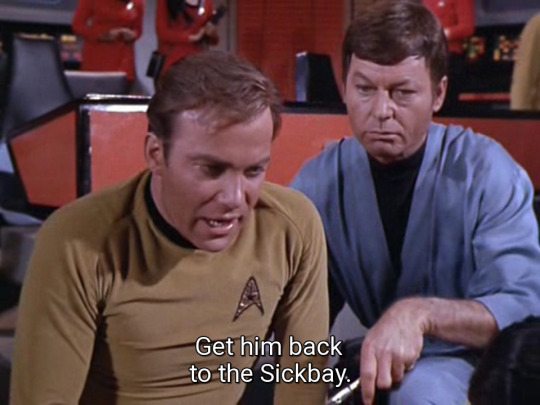

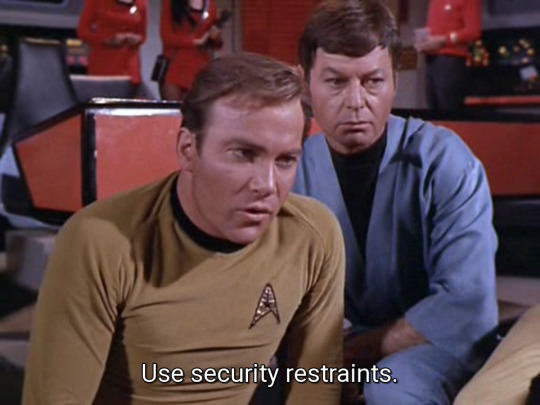
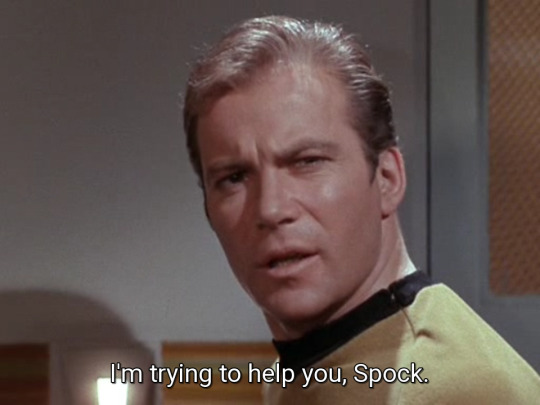

But! In the episode before that, The City on the Edge of Forever, we get the iconic exchange of:
Edith Keeler: Whatever it is, let me help.
Kirk: "Let me help." A hundred years or so from now, I believe, a famous novelist will write a classic using that theme. He'll recommend those three words even over "I love you."
Funny how certain phrases and events parallel or cycle back around between consecutive (by air date, not production code) episodes. Interesting. Fascinating, even. (I am fully aware of the caveat that my brain is seeking out patterns, I am lost in the Spirk sauce/soup/brainrot/whatever, etc.)
#star trek tos#spirk#amok time#operation: annihilate#the city on the edge of forever#tos parallels#only got about 8 minutes and 30 seconds into amok time before posting affvnnvjnv oh boy!!! bodes well#trek meta
332 notes
·
View notes
Text
I'm gonna be frank, Eddie just does not give me the impression that he was bullied all that much in high school to me. Especially as he got older, like he was the school drug dealer, he was not getting beat up by the same jocks who were going to be buying from him later that week. It just doesn't make sense to me!
I'm not saying he was never bullied at all (personally I think he was probably bullied by the people in his grade in like middle school, but leant more into the satanic image by the time he got to high school (which is when the satanic panic wouldve been starting) and people became more afraid to mess with him or it stopped when BS started dealing) or that people can't headcanon and project onto pm. It's fandom, do what you want lol. I've just gotten to the point where fics lose me whenever they claim Tommy/Steve/Jason was going around beating the shit out of him or shoving him in the halls every week or the like. Eddie just does not give the impression that he is scared of the jocks normally. He looks down on them and thinks he's better than them! He taunts them openly in front of everyone and pontificates on table tops.
I think if you take it in that context too, it makes the town turning on him more sinister? Like obviously, satanic panic was only growing at that point, and it was within the last year or two they started pointing at metal and D&D as recruiting centers for satanic cults. (Eddie also like an asshole is walking around with a satanic symbol on his jacket - peak edgy teen in the middle of a moral outcry.) But while people might've been afraid of him, and most definitely talked about him behind his back, that's worlds away from mob violence. The change was startling, even if Eddie might be able to see it on the horizon.
Idk to me that's more of what the hunt the freak line was about. The knowledge that they could turn on you and would if you gave them a reason (or if you want to go with the Eddie is closeted interpretation - if he got outed). I think he probably has been called the freak for a while but honestly I think he's proud of it at this point.
Obviously all of this is up to interpretation, I guess I've just gotten to the point where a lot of the popular fanon interpretation doesn't feel like Eddie to me anymore
#eddie munson#st meta#fandom wank#i guess#also like i said if you interpret it that way like i do think eddie is queer (bi specifically) but like lol not really the point of the post#also i just know someone eventually is gonna call me a tommy apologist#like lol nah i just think tommy is too much of a pussy to beat someone up#that boy has not punched someone in his life#also ngl uncomfortable ghat its a constant point of contention in steddie fics that steve or steves friends used to bully eddie#like no i dont want that in my ship fic#eddie#also i just want a more confident eddie#one who has had shit happen to him and is pretty fucking weird but owns it#and isnt a sad boy who is constantly beat up all the time#thats boring!
605 notes
·
View notes
Text
i feel that so many people seem to take the basis of naruto and sasukes characterization and switch them…. i see too many people infer naruto is made of happiness and love while sasuke of hate and anger but i have always seen naruto as a character that is full of hatred and anger and he has to let go of that with the love of others. sasuke as a character is so full of love yet he has to follow that through with grief and anger and learn to bear others hatred.
naruto never really had the heaviness of love in his heart until he went through the process of controlling kuramas chakra and had to confront the hatred inside him. frankly it says it blatantly that he had always held hatred in his heart for the situation he was forced into and the way the village treated him because of it, until he was able to accept and move past that hatred and have love for kurama and his dad and the people of his village. so i genuinely don’t understand where this notion that naruto is just pure sunshine and happiness came from. sasukes whole story starts out with wanting revenge on his brother because he loves his family and his clan so much. it’s a constant clear notion that he hurts so bad from his brother’s betrayal because he loved his brother, and that his rage against konoha is because he loved his clan that konoha sanctioned a genocide of. it’s constantly stated that the uchiha hold intense love in their hearts.
it’s sasukes connection with the people around him that formed his love where it’s the lack of that connection that formed narutos hate…. the way they expressed their emotions is very different because they’re both in insanely different scenarios no matter how much they understand the others pain. narutos hatred makes him want to finally receive the love that the village never gave him, but sasukes love makes him want the village to experience the pain that they inflicted upon him and his clan… maybe sasuke expresses his love more negatively and maybe naruto expresses his hate more positively, but that doesn’t change the fact that sasukes actions came from a place of love and narutos actions came from hate. they just needed each other to balance the other out….
#this has certainly been said before in much better ways but#i’ve just seen a bunch of naruto=happy go lucky loverboy and sasuke=gloomy sad hater recently and#its so frustrating to see naruto portrayed as some sunshine boy all the time bc#like i get that naruto is sun coded and sasuke is moon coded but#that rlly doesn’t mean naruto is just some great amazing happy go lucky guy all the time#naruto has some serious attitude towards people for no reason 😭😭 he literally starts beef with people for no reasonnnn#naruto#meta#jitter bugs u
1K notes
·
View notes
Text
The fact that Main-verse Ooo is as good and as kind as it is (relative to the other universes shown so far, at least, it's obviously not perfect) all because of the same character that starts off as the OG series' antagonist, the person we were made to see as the bad guy (albeit an often ineffectual one) for several seasons, is making me lose my mind.
Imagine finding out the guy you spent your childhood beating up and saving princesses from is in fact a driving catalyst behind you being able to exist, and not only exist but also live in a world that knows what kindness is. All because that man, the same man who you've witnessed do terrible things, once met a little girl and taught her how to be good.
Simon's story really shows us that even if you lose your way and forget how it is to be good yourself, the world keeps the memory for you. That act of love Simon showed Marcy by protecting her and seeing her as more than the monster she thought herself to be created ripples upon ripples, small at first but eventually enough to help give their wreckage of a world—a world that easily could have been forsaken, its goodness overlooked because of its inhospitable remains—a chance to grow into something beautiful. Because of those very same ripples Simon created, the people of Ooo grew up in a world where they know enough about kindness that they were able and willing to spare the 'bad guy' some, to see beyond the wreckage and allow him to grow too.
In saving Marceline, Simon helped to not only to save the world, but also himself.
#fionna and cake#fionna and cake spoilers#adventure time#simon petrikov#ice king#marceline abadeer#simon and marcy#meta#this was just a phone note to get thoughts out of my system but then it came out semi-coherent#so welp guess i'm writing meta now. i'm really in the deep end now. but yeah...Ice King and Simon's story being about the power of kindness#A cruel world requires constant cruelty to be maintained. But kindness? That reaches across time. one act of kindness sparks another#'I need to save you but whose going to save me?' That act of love and compassion is gonna save you ya dingus....eventually#In a less kind world finn and Jake could have watched those tapes about Simon and still decided IK was a hopeless cause.#That he was too far gone to be saved. But they didn't. They chose to treat him nicer and actually be friends with him.#One thing i always loved about IK's story is that he didn't have to completely change himself for people around him to treat him better#They changed their perspective and were kind to him and it was THAT that helped him change. to grow beyond the 'antagonist' role#to quote my go to and all time favourite good place quote:#'the point is people improve when they get external love and support. How can we hold that against them when they don't?'#Arrgh sorry I just always loved Ice King's arc in the show. From pesky antagonist to the person Finn dived into a chaos god to save#(the world's new beginning and its near ending being all because of simon. he has such main character energy and boy does he not want it)#And now we're getting Simon stuff and I'm so normal I'm so normal I'm so normal (<- has never been normal about this character)#(i...i have many MANY drawings of ice king and simon from 2015 and the years after. i was doomed from the start. F&C was the final straw)#(as was reading marcy's secret scrapbook recently...and here i thought i'd truly reached the capacity of hurt i can feel about these two)#Going insane over these last two episodes. 'she didn't have a me'. Fionna and Simon bonding. Gumlee kiss. PETRIGROF BACKSTORY#and the implication that Simon isn't remembering it accurately? Their sweet sounding love song actually foreshadowing their issues?#I am clawing at the walls. thank you AT crew you are enriching the enclosure that is my brain
466 notes
·
View notes
Text
happy fuck the rose and you as well sunday! in honor, I am posting my thoughts about the line in pump shanty, because god do I have thoughts!
there are no rose reds at that point, right? they're fleeing the wedding. The only Rose explicitly in canon is... Rose. Snow's sister, who's just been kidnapped. Even for Greyditch, this seems... a little insensitive, to say the least.
But! There's also the phrasing. It's not "fuck Rose." It's "fuck the Rose."
See also Our Boy Jack. "When the red Rose, it comes a'marching," and "when the Rose comes over the water." Now, these could very concievably both refer to the Rose Reds, but consider: what if they don't?
What if the Rose is an established Crown insignia? Greyditch isn't saying fuck Rose, he's saying fuck the Crown. This makes a lot more sense in context.
This leads me to believe that Rose was named for the Crown symbol, which. Adds whole new layers to everything that happens to her. Woman destined from birth, by her name, to be a tool for Cole. I think her parents saw her red hair (the Crown’s color) and named her for it, in the hopes she’d continue their family’s legacy of serving the king. And she did, and every one of her clones did, to hundreds of thousands of deaths…
#this also plays nicely with Travis gunpowderdtim’s headcanon that giants in our boy Jack refers to the rose reds#as in giants is a slang term/slur for them#but that’s not terribly relevant to the main point of Rose vs The Rose#she never had a chance really…#the mechanisms#the mechs#ouatis#rose ouatis#once upon a time in space#my meta#don’t even get me started on her family legacy and WHY they’re one of the noblest families….#or rather my headcanon for why they are
351 notes
·
View notes